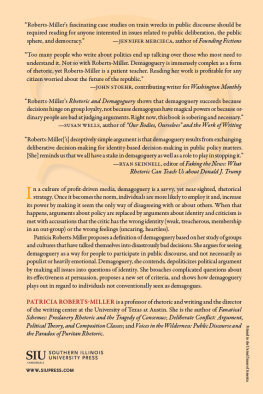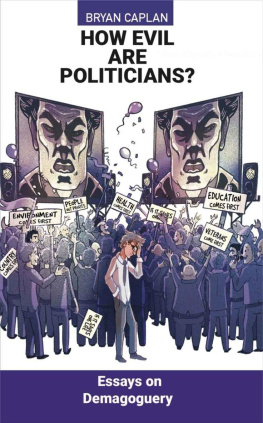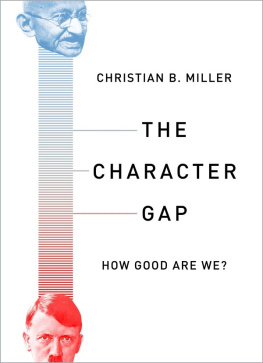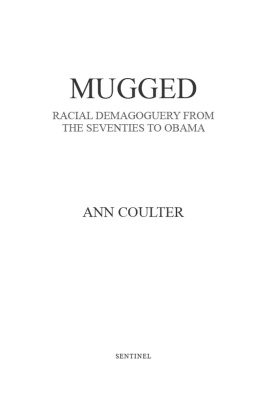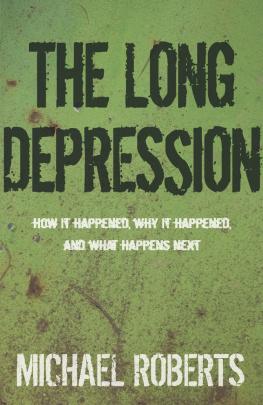Patricia Roberts-Miller - Rhetoric and Demagoguery
Here you can read online Patricia Roberts-Miller - Rhetoric and Demagoguery full text of the book (entire story) in english for free. Download pdf and epub, get meaning, cover and reviews about this ebook. year: 2019, publisher: Southern Illinois University Press, genre: Politics. Description of the work, (preface) as well as reviews are available. Best literature library LitArk.com created for fans of good reading and offers a wide selection of genres:
Romance novel
Science fiction
Adventure
Detective
Science
History
Home and family
Prose
Art
Politics
Computer
Non-fiction
Religion
Business
Children
Humor
Choose a favorite category and find really read worthwhile books. Enjoy immersion in the world of imagination, feel the emotions of the characters or learn something new for yourself, make an fascinating discovery.
- Book:Rhetoric and Demagoguery
- Author:
- Publisher:Southern Illinois University Press
- Genre:
- Year:2019
- Rating:5 / 5
- Favourites:Add to favourites
- Your mark:
- 100
- 1
- 2
- 3
- 4
- 5
Rhetoric and Demagoguery: summary, description and annotation
We offer to read an annotation, description, summary or preface (depends on what the author of the book "Rhetoric and Demagoguery" wrote himself). If you haven't found the necessary information about the book — write in the comments, we will try to find it.
Rhetoric and Demagoguery — read online for free the complete book (whole text) full work
Below is the text of the book, divided by pages. System saving the place of the last page read, allows you to conveniently read the book "Rhetoric and Demagoguery" online for free, without having to search again every time where you left off. Put a bookmark, and you can go to the page where you finished reading at any time.
Font size:
Interval:
Bookmark:

RHETORIC AND DEMAGOGUERY
Southern Illinois University Press
www.siupress.com
Copyright 2019 by the Board of Trustees,
Southern Illinois University
All rights reserved
Printed in the United States of America
22 21 20 19 4 3 2 1
Cover design by Mary Rohrer
Library of Congress Cataloging-in-Publication Data
Names: Roberts-Miller, Patricia, 1959- author.
Title: Rhetoric and demagoguery / Patricia Roberts-Miller.
Description: Carbondale : Southern Illinois University Press, [2019] | Includes bibliographical references and index.
Identifiers: LCCN 2018021584 | ISBN 9780809337125 (paperback : alk. paper) | ISBN 9780809337132 (e-book)
Subjects: LCSH: RhetoricPolitical aspects. | Communication in politics.
Classification: LCC P301.5.P67 R65 2019 | DDC 808/.0427dc23 LC record available at https://lccn.loc.gov/2018021584
Printed on recycled paper. 
This is the only book project in which Ive been engaged that was closely connected to a course I taught on a regular basis, and so, first, I should thank John Ruszkiewicz for trusting me with the class. I am ineffably indebted to the many students who made it through that class during the various semesters, a course that began with Nazis and ended with neo-Nazis, and traveled through fascism, totalitarianism, authoritarianism, genocide, and various other cheerful topics. The students were excellent, pushing me and my thinking, and, I hope, came away more skeptical and thoughtful about public deliberation. Many of those students afterward became friends, and have continued to argue about demagoguery with me in social mediasending interesting articles, odd links, their own writing on the subjectand have generally shown that teaching is an extraordinarily rewarding profession. I wish I could name them all, but it would take pages and pages.
Im also grateful to friends and colleagues who have indulged my fascination with the dark side of rhetoric, arguing about it with mein person and virtuallysometimes reading drafts and sometimes commenting on blathery posts, suggesting readings, and giving me encouragement through two fairly discouraging research projects in a row. While there are too many to name, there are a few whom I have to mention: James Atkinson, Janet Atwill, Randy Cauthen, Janet Claus, Diane Davis, Alex Fischer, Gretchen Goldsmith, Joshua Gunn, Jackie Henkel, John Jones, Seth Kahn, Bill Keith, Janet Dixon Keller, Bonnie Kyburz, Donald Lazere, Drew Loewe, Owen Maercks, Dave Mauch, Cody Melcher, John Murphy, Roxanne Mountford, Kel Munger, David Newheiser, Luke Oett, Malea Powell, Danielle Terrier Reagan, Jenny Rice, Jim Ridolfo, Donnie Johnson Sackey, George Schorn, Ryan Skinnell, Martha Stockton, Paul Wallich, and Susan Wells. Casey Boyle, Rasha Diab, Justin Hodgson, Snehal Shingavi, Clay Spinuzzi, Jeffrey Walker, and Aaron Zacks have engaged in long and thoughtful conversations while I lingered in their doorways.
Various colleagues have helped me with manuscript preparation along the way, especially Megan Eatman, who prepared the list of works cited and retrieved two lost chapters; David Devine, who revised the works cited; Joshua Lee and Kirsten Holliday, who helped with article versions; and David Daniel who found sources. Davida Charneys insightful criticisms of my previous book helped with this one considerably. Im also deeply indebted to fellow members of various writing groups over the last few years, who generously read many versions: Todd Battistelli, Douglas Coulson, Eric Dieter, Megan Eatman, Marjorie Foley, Kendall Gerdes, Megan Gianfagna, Rhiannon Goad, Hannah Harrison, Justin Hatch, Tekla Hawkins, Rodney Herring, Vicky Hill, Nathan Kreuter, Mark Longaker, Stephanie Odom, Rachel Schneider, Jeremy Smyczek, Connie Steel, Jazmine Wells. The excellent research librarians and subject specialists at the University of Texas Perry-Castaneda Library have found sources, answered odd questions, and have been tireless in tracking down information.
I am grateful to Carolyn Miller and the Rhetoric Society Quarterly for publishing an early version of part of the second chapter under the title Dissent as Aid and Comfort to the Enemy: The Rhetorical Power of Naive Realism and Ingroup Identity, and to Martin Medhurst, who published as a forum an early version of my thinking on this topic (Democracy, Demagoguery, and Critical Rhetoric). J. Michael Hogan and Dave Tell responded with Demagoguery and Democratic Deliberation: The Search for Rules of Discursive Engagement (Rhetoric and Public Affairs, vol. 9, no. 3, Fall 2006, pp. 47987), James Darsey with Patricia Roberts-Miller, Demagoguery, and the Troublesome Case of Eugene Debs, and Steven Goldzwig with Demagoguery, Democratic Dissent, and Re-Visioning Democracy (Rhetoric and Public Affairs, vol. 9, no. 3, Fall 2006, pp. 47178). Their criticisms helped me rethink most aspects of the project, and understand ways I was being unclear. Tolerant audiences at various talks have encouraged, criticized, and usefully challenged this work. Im thankful that Carnegie-Mellon University, University of Denver, University of Illinois, San Diego State University, Texas A&M, University of Tennessee, Michigan State University, and Furman University invited me to present parts of it. Rhetoric Society of America and College Composition and Communication conferences have been invaluable sites for discussion and criticism.
More difficult to express is the intellectual debt I owe to so many scholars whose work has helped me tremendously, including some I have never met. Tetsuden Kashima, Elliot Aronson, Herbert Simons, and Greg Robinson graciously exchanged email with me. Others, whose work informed this book, but whose scholarship I never cite, include Shirley Wilson Logans work on nineteenth-century African American women rhetors, Michael Ignatieffs work on war andnationalism, Daniel Kahnemans work (which should be much more influential in rhetoric than it is), and Alistair Hornes haunting book The Savage War of Peace. Wayne Booth, Fred Antzcak (from whom I took a sophomore-level rhetorical theory course), Martha Nussbaum (whom I have never met, but whose reading of classical texts changed my thinking), and Robert Ivie (whom I met only briefly) have also been significant influences.
The faculty of the Department of Rhetoric and Writing has encouraged me, tolerated me, and listened to me, and the staff, especially Jamie Duke, Tracye Keen, Holly Schwadron, Stephanie Stickney, and Anna Crain have been supportive, patient, and endlessly helpful. For the last three years, I have also been supported and tolerated by the staff of the University Writing CenterAlice Batt, Ben Kitchen, Vicente Lozano, Natalie San Luis, Michele Solbergand an extraordinary group of graduate students. I have a supportive deans office, not something everyone can say, for which I am also grateful.
Another version of this argument has been published as Democracy and Demagoguery by The Experiment, and it shares the same proposed definition of demagoguery. The staff and editors there made suggestions that not only made that version better, but this one.
I and Southern Illinois University Press are deeply appreciative of the Presidents Office of the University of Texas at Austin and its tremendously important subvention grants program for contributing to the publication costs of this book and so many others.
The dogs have rather enjoyed the project, as it has meant a lot of long walks with my nattering away at them; the cats found this project just as boring as anything else Ive done. My loving husband and indulgent son have found the nattering less entertaining and harder to ignore politely, and now know more about white supremacists, homophobes, eugenicists, and the epistemology/ontology distinction than they ever desired. But their intelligent questions and suggestions have been more helpful than they could imagine.
Font size:
Interval:
Bookmark:
Similar books «Rhetoric and Demagoguery»
Look at similar books to Rhetoric and Demagoguery. We have selected literature similar in name and meaning in the hope of providing readers with more options to find new, interesting, not yet read works.
Discussion, reviews of the book Rhetoric and Demagoguery and just readers' own opinions. Leave your comments, write what you think about the work, its meaning or the main characters. Specify what exactly you liked and what you didn't like, and why you think so.

